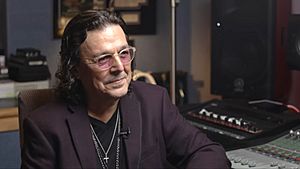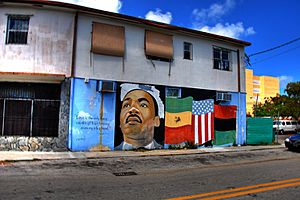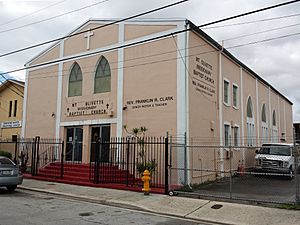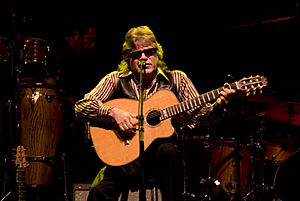Rudy Pérez facts for kids
Quick facts for kids
Rudy Pérez
|
|
|---|---|

Rudy Pérez in 2022
|
|
| Background information | |
| Birth name | Rudy Amado Pérez |
| Born | May 14, 1958 Pinar del Río, Cuba |
| Genres | |
| Occupation(s) |
|
| Instruments | |
| Years active | 1983–present |
| Labels |
|
Rudy Amado Pérez (born May 14, 1958) is a famous musician from Cuba who became an American citizen. He is known for writing songs, creating music, and producing albums for many popular artists. He also helps others in the music industry and supports good causes.
Rudy Pérez is especially good at writing slow, emotional songs called ballads. However, he has also worked on many other types of music. He has produced over 70 albums and written more than 1,000 songs. Over 300 of his songs have become number one hits or reached the top 10 charts!
He has worked with huge international stars like Christina Aguilera, Jennifer Lopez, Marc Anthony, Luis Fonsi, and Beyoncé. Rudy Pérez has won many music awards. Billboard magazine, a very important music publication, named him "Producer of the Decade" in 2010. This was because he had the most top 10 hits of any producer during that time. He was also the first Latin producer to win Billboard's "Producer of the Year" award four years in a row.
Rudy Pérez owns two music companies: Rudy Pérez Enterprises (RPE) and Bullseye Productions. He also helped start the Latin Academy of Recording Arts and Sciences (LARAS), which created the Latin Grammys. He played a big part in the first Latin Grammy Awards in 2000. In 2013, he helped create the Latin Songwriters Hall of Fame in Miami Beach. This organization celebrates important Latin songwriters and encourages new ones.
Contents
Rudy Pérez's Early Life
Rudy Amado Pérez was born on May 14, 1958, in Pinar del Río, Cuba. His family was Baptist, and his grandfather was a minister. His father, Rudy Amado, was a painter and writer. His mother, Elsa Pérez, was a seamstress. Rudy also had two sisters and a brother.
When Rudy was nine years old, his family moved to the United States. They left Cuba to escape the political situation there. The Pérez family first lived in a refugee camp in Miami. Soon after, they settled in Liberty City, Florida.
Rudy loved music from a young age. He was influenced by Cuban music styles like bolero and also by rock music. He started singing when he was only two years old. People said he could sing perfectly in tune. He would even use everyday objects as if they were musical instruments.
After hearing the music of a famous pianist named Frédéric Chopin, Rudy wanted to become a musician and learn piano. The same year his family arrived in the U.S., he started singing and playing in his neighborhood Baptist church choir. The ministers there taught him to sing and play the guitar and piano. Rudy was also influenced by the African-American community around him, which introduced him to R&B and gospel music.
When he was twelve, Rudy worked for a company that made barbed wire. He saved his money to buy an electric guitar. His parents couldn't afford to buy him one. After a year of hard work, he bought his first guitar. He couldn't play it for three months because his hands were injured from working at the factory. After that, he started taking private guitar lessons. As a teenager, he worked at hardware stores, gas stations, and as a valet. He did all this to buy more instruments and equipment.
Joining a Band: Pearly Queen
Rudy Pérez left school to join rock bands in his neighborhood. When he was 15, he joined a group called Pearly Queen. This band was popular in Miami in 1973. They were a "cover band," meaning they played popular songs by other artists. They sang in English and had to play the hit songs of the time.
Pearly Queen got a contract to play in many clubs across the U.S. and Canada. They played five shows a night, five or six nights a week. Playing in these clubs taught Rudy a lot about music production. He was in charge of arranging the songs the band covered. This made him want to learn more about arranging and recording music.
The band released two albums, Treasure Hunt (1974) and Disco? (1976). They also had four singles. Rudy stayed with Pearly Queen for five years. When he was twenty, he left the band. He wanted to focus on producing and writing songs for Latin singers in Miami.
Becoming a Songwriter and Producer
Starting in Miami Sound Studios
After leaving Pearly Queen, Rudy Pérez started working at Miami Sound Studios. He began as a "gofer," doing small tasks like cleaning the studio or getting food for the staff. He even lived in the studio for two years after a divorce. Living there, he watched and learned every detail about making music. He learned about sound engineering.
In 1983, he moved to Pablo Cano's studios, Clímax, in North Miami. He worked there without pay and was allowed to live at the studio for a year and a half. He kept learning by watching how albums and songs were recorded for other artists. He really wanted to record his own songs, not just make demo tapes for friends.
One day, Pablo Cano's niece heard Rudy singing a song he had written. She showed the song to Cano, who was very impressed. Cano decided to hire Rudy permanently and pay him well to make an album. This was Rudy's first big chance as a composer. Cano offered him the chance to record with a band and present his music to a record company.
The band recorded four of Rudy's songs. Top music arrangers even asked for his material. However, Rudy wasn't happy with the changes being made to his songs. He decided he wanted to make his music the way he "felt them." During this time, he also started working with other artists he met at the studio, like Roberto Carlos and Gloria Estefan. He continued to study music.
Finally, in 1983, Rudy Pérez released his own album called ¿Qué voy a hacer sin tí? (What am I going to do without you?). Jose Menendez, who worked at RCA Records, heard the album and decided to hire Rudy.
This was when Rudy Pérez truly became a producer. A few weeks later, while on a trip to Puerto Rico, he met José Feliciano. Menendez had played Rudy's song "¿Qué voy a hacer sin tí?" for Feliciano. Feliciano then asked Rudy to produce his next album. Rudy produced most of Feliciano's album Ya soy tuyo (I'm already yours). The song "Me has echado al olvido" (You have thrown me into oblivion) from that album became number one. This album also received two Grammy Award nominations in 1985. It helped José Feliciano become a top Latin music artist again. Rudy Pérez continued to work with Feliciano for two decades.
Producing and Composing Since 1986
Rudy Pérez's album ¿Qué voy a hacer sin tí? earned a Gold record award. In 1986, he won a Grammy Award as a producer for José Feliciano's song "Ya Soy Tuyo" (I am already for you). In 1988, Billboard magazine named him "Producer of the Year" for the first time. His success with Feliciano opened doors for him to work with many other singers.
In 1992, WEA, a record company, hired him to help produce the album Aries for Luis Miguel. This meant Rudy had to sign a contract that prevented him from producing for other artists until 1997. In 1993, he won another Grammy Award as a producer and songwriter for Luis Miguel's album Aries. The next year, Rudy released his second solo album, Rudy. The most popular song from it was "Mi manera de querer" (My way of loving). However, this album wasn't very successful, so Rudy decided to focus only on his career as a composer.
In 1997, after his contract with WEA ended, Rudy Pérez wrote and produced the album Lo Mejor De Mi for Mexican singer Cristian Castro. This album had hit songs like the title track, which stayed on the charts for over 90 weeks. Other hits included "Después de Ti...¿Qué?" (dedicated to his mother) and "Si Tú Me Amaras". This album reached number one on the Hot Latin Tracks chart in 1997. It was also nominated for a Grammy Award for Best Latin Pop Album in 1998. The title song was even included in a 1999 compilation of Billboard Latin Music Awards hits. This successful album, along with other songs Rudy wrote, won him ASCAP Awards in 2000.
In 1997, Ricky Martin also had a number one hit on Hot Latin Tracks. In 1999, Rudy received an Ace Award for "Album of the Year" for José Feliciano's Senor Bolero. He also won an award for producing the album Llegar A Ti by Christian artist Jaci Velasquez. This album included the ballad "Solo Tú," which reached the top 10 on Billboard's Latin chart. That year, Rudy received the ASCAP Award for "Songwriter of the Year."
In 2000, Rudy Pérez produced the album Eterno for Luis Fonsi. He wrote seven of its 13 songs, including the hit "Imagíname Sin Ti" and its English version, "Imagine Me Without You."
Also in 2000, because of his successful work with Jaci Velasquez, Rudy decided to produce the Spanish-language album Mi Reflejo for Christina Aguilera. This album became one of the most successful Spanish albums in the world. It sold 1 million copies in the U.S. and 2.5 million more worldwide. It won the 2001 Latin Grammy for "Best Female Pop Album." The success of this album and the Grammy he received allowed him to work with English-speaking artists. He produced and composed Spanish songs for singers and bands like Westlife and Michael Bolton.
After Rudy worked on the Spanish songs for these artists, they also wanted him to work on their English songs. For example, his work with Jaci Velasquez led to the song "Imagine Me Without You." This was an English version of the song he produced earlier for Luis Fonsi, "Imagíname sin tí." It was nominated for a CMA - Dove Award for Best Song of the Year. In 2002, Rudy Pérez wrote "I Wanna Hear You Say It" for Michael Bolton's English album. He also worked on English songs for other singers.
Many of Rudy's songs have become top ten hits. In 2002, the song he produced for Pilar Montenegro, "Quítame ese hombre," was the first to reach number one. It stayed there for 13 weeks! After this, he continued to write and produce many more number one songs. Another of his songs, "El Dolor De Tu Presencia" by Jennifer Peña, also produced in 2002, stayed at number one for nine weeks.
In 2004, Rudy Pérez started his own record label, Rudy Pérez Enterprises (RPE).
In 2005, Rudy was chosen as the Latino producer/songwriter of the year. He also wrote songs for all of Il Divo's albums. Between 2006 and 2007, he produced Beyoncé's Spanish album Irreemplazable, which was nominated for a Grammy.
In September 2009, he launched his second record label, Bullseye Productions.
In January 2010, he won the "Producer of the Decade" award from Billboard. This was for his consistent success on the music charts over ten years.
In 2012, Rudy Pérez released his third album, Lo mejor de mí (The best of me). This album was a collection of many songs he had composed for other singers, but he sang them himself. Later, he produced the first Spanish language album for American singer Natalie Cole, called Natalie Cole en Español, released on June 25, 2013. In 2014, Rudy Pérez released the single "Despues de ti... ¿Qué?", which he sang himself for Mother's Day.
Music in Other Media
Rudy Pérez has also written and produced many songs for movies and TV shows. His music has been featured in films, soap operas, sitcoms, and commercials.
He has worked with advertising companies, creating music for ads. For example, he wrote and produced music for AT&T's "True Voice" and "Leadership" campaigns, sung by Jon Secada. Rudy also wrote the original theme song for Univision, a major Spanish-language TV network, in 1995. This song is still used today. He also composed the main theme for a special Valentine's episode of the TV show Beverly Hills, 90210. In 1992, Disney hired him to work on the song "Colors of the Wind" for the animated movie Pocahontas.
His songs have also been used for sports events. In the late 1990s and early 2000s, he wrote and produced the official Olympic song for Telemundo's Olympic coverage. He also wrote "Vamos al Mundial" (Let's go to the World Cup), which was used by Univision Network for the 2002 World Cup. Jennifer Peña sang this song.
In 2007, Rudy Pérez produced the song "Amor Gitano" for the soap opera Zorro, La Espada y la Rosa. This song was a duet by Alejandro Fernández and Beyoncé. In 2011, he wrote "La fuerza del destino" with Mauricio Abaroa Suzarte. Marc Anthony and Sandra Echeverría sang this song for the soap opera of the same name.
A journalist once said that Rudy's songs are used for all kinds of feelings and moments, like breakups, getting back together, falling in love, wedding dances, and even teenage drama.
Other Projects
On April 23, 2007, Rudy Pérez started working with a global online community called elHood.com. This allowed him to create music projects directly with music fans. Their first project was an album for singer and actress Pilar Montenegro. Fans could go to the singer's website, listen to songs from her new album, vote for their favorites, and share their thoughts. One fan was even chosen to join Pilar and Rudy in the studio during the album's production.
Pérez was one of the people who helped start the Latin Council of the American Society of Composers, Authors and Publishers (ASCAP). He and Desmond Child created the Latin Songwriters Hall of Fame (LSHOF), which opened in October 2012 in Miami Beach. Its goal is to honor important Latin songwriters and inspire new ones. They do this through workshops, scholarships, and other programs.
The Hall of Fame has a committee that chooses 24 Spanish and Portuguese songwriters. From these, five winners are selected. To be considered, a composer, artist, or song must have been successful for at least 20 years.
The foundation was officially registered in 2012. They are building a museum in Miami that will show things related to Latin music. It will have information about great composers, the stories behind famous songs, and other educational materials. The museum will offer art galleries, music, educational workshops, music classes, and songwriting contests. Rudy Pérez and Desmond Child plan to expand this foundation to Mexico and Argentina. The museum opened in 2014.
On April 23, 2013, the first awards gala was held in Miami. It honored seven famous songwriters, including José Feliciano and Julio Iglesias.
Rudy Pérez is currently working on a book. It will share thousands of stories about the many artists he has worked with.
Awards and Recognition
Rudy Pérez's songs have been incredibly successful. Over 300 of his songs have been number one hits or reached the Top 10 charts in the last 20 years. Some of them stayed at the top for many weeks, like "Quitame ese hombre" (13 weeks) and "El Dolor de tu precensia" (9 weeks). He won the Hot Latin Songs award and was the first Hispanic composer and producer to win it. He was also chosen as "Producer of the Year" for four years in a row. He has won the ASCAP "Songwriter of the Year" award five times.
His successful work has earned him 30 gold records and 50 platinum records. He has been nominated for 19 Latin Grammy Awards and has won five of them. Many people consider him one of the "most outstanding creators" in international pop music. He was also voted the most important Latin composer. In 2010, Billboard magazine gave him the title of "Producer of the Decade." This was because he had more number one and Top Ten hits from 2000 to 2010 than any other producer in Latin history. He was also elected the first president of the Florida branch of NARAS.
Rudy Pérez has received over 400 awards for albums that have sold enough copies to be certified gold and platinum.
Helping Others: Philanthropy
In 2003, Rudy Pérez started a scholarship program with the ASCAP Foundation. It's called the Rudy Pérez Songwriting Scholarship. This program helps talented Hispanic songwriters who don't have many resources. It allows them to study at famous music schools around the world. He gave $25,000 to start the first scholarship. The scholarship rotates each year among students from five universities. The first scholarship was given in Miami. Others are given to schools like the Juilliard School of Music in New York City and the Conservatory of Music of Puerto Rico.
In 2012, Rudy Pérez, along with David Frangioni, Mark Hudson, and Jon Secada, created an educational program for young musicians called IDA ("Inspire & Develop Artists"). This program guides and teaches young people to develop their musical talent. The program lasts one week. A talented participant is chosen by Rudy's team, which includes composers, engineers, singing teachers, and musicians. The chosen participant gets to work with the four main mentors, including Rudy himself. Rudy says that after just one week in the program, the young person "goes a superstar."
The program teaches singing, composing, recording, mixing, and studio technology. It also includes rehearsals, live performances, stage presence, and special guests from the music business. Classes are kept small, with a maximum of 12 people, so everyone gets personal attention. Participants work with teachers and experts to learn all parts of the music industry. By the end of the program, each participant has the skills to start a career. They learn about creating an image, choreography, business basics, and recording their own song.
The program was first offered in English. In January 2013, it was also released in Spanish.
Personal Life
Rudy Pérez has one daughter from his first marriage, which happened when he was 19. He has four more children with his second wife, Betsy.
He has said that his life inspires his songs, but he only writes about what he would like to experience. He admires many artists, including classical composers like Frédéric Chopin and Giacomo Puccini, and modern artists like The Beatles and Stevie Wonder.
Rudy shared a story about why he started writing songs in Spanish. While he was in the band Pearly Queen, he only composed English songs. But after dating a Spanish girl in Miami whose parents didn't approve of their relationship, he heard Julio Iglesias's song "Abrázame" (Hold me). From that moment on, Rudy decided to also write songs in Spanish.
Discography
Besides being a composer and producer, Rudy Pérez is also a singer. His albums fall into two groups: those he released with the rock band Pearly Queen (1973–1977) and those he released as a solo artist.
Pearly Queen
- Treasure Hunt - 1974
- Disco? - 1976
As a Solo Artist
- ¿Qué voy a hacer sin tí? - 1984
- Rudy (also known as "Sencillos y otros"; in English: Singles and others) - 1994
- Lo mejor de mí ("The best of me," a collection of his songs, sung by him) - 2012
Awards
American Society of Composers, Authors and Publishers Awards
Pérez has won the following ASCAP awards.
| Year | Nominee / work | Award | Result |
|---|---|---|---|
| 1994 | "Ayer" | Pop Songs | Won |
| 1995 | "Tu y Yo" | Won | |
| "Vivir lo Nuestro" | Tropical Songs | Won | |
| 1996 | "Se Mi Sigue Olvidando" | Won | |
| 1998 | "Lo Mejor de Mí" | Pop Songs | Won |
| 1999 | Won | ||
| "El Amor Nunca Pregunta" | Tropical Songs | Won | |
| Himself | Songwriter of the Year | Won | |
| 2000 | Won | ||
| "Una Voz en el Alma" | Pop Songs | Won | |
| "De Hoy en Adelante" | Won | ||
| "Después de Ti...¿Qué?" | Won | ||
| 2001 | "Que Voy a Hacer Sin Ti" | Regional Mexican Songs | Won |
| "Imaginame Sin Ti (Imagine Me Without You)" | Pop/Balada Songs | Won | |
| "Solo Tú" | Won | ||
| 2002 | "Cómo Se Cura una Herida" | Won | |
| 2003 | "El Dolor de Tu Presencia" | Won | |
| "Hay Otra en Tu Lugar" | Won | ||
| "Quisiera Poder Olvidarme de Ti" | Won | ||
| 2004 | Himself | Songwriters of the Year | Won |
| "Si No Estás" | Pop/Balada Songs | Won | |
| 2005 | Himself | Songwriter of the Year | Won |
| "Te Llamé" | Pop/Balada Songs | Won | |
| "Vivo y Muero en Tu Piel" | Won | ||
| 2011 | "Amor Quédate" | Pop/Ballad Songs | Won |
| 2012 | "Mi Corazón Insiste" | Pop Songs | Won |
See also
 In Spanish: Rudy Pérez para niños
In Spanish: Rudy Pérez para niños
 | Selma Burke |
 | Pauline Powell Burns |
 | Frederick J. Brown |
 | Robert Blackburn |




